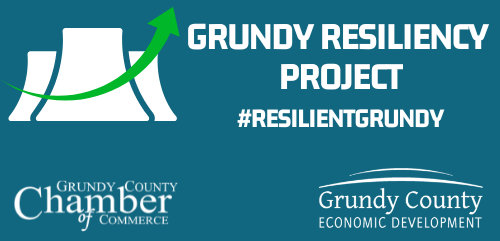The Grundy County Chamber and Channahon Minooka Chamber has sent this letter to our local legislators asking for specific action to help our local businesses.
The COVID-19 pandemic has changed life as we know it. As consumers are told to socially distance and settle indoors, the business community is taking a devastating hit. Consumer spending makes up nearly 70 percent of the United States economy, and it has come to a screeching halt. This has resulted in businesses facing large layoffs, a lack of demand and a loss of revenue. As a coalition of chamber of commerce organizations from across the state, we have banded together in this time of crisis to propose the following series of actions for Illinois:
- Shift the Minimum Wage Increase Schedule
- On January 1, 2020 Illinois’ minimum wage increased to $9.25/hour—up one dollar from 2018. July 1 of this year is scheduled to mark the second increase as Illinois’ minimum wage will increase to $10. By shifting the increase to $10 to January 1, 2021, businesses will not have to take on the burden of resuming normal business operations with already increased overhead costs of payroll while revenue is decreased from this time of social distancing. In turn, this encourages businesses to resume operations with full staff and provides additional recovery time before overhead costs increase. With acceptance of this proposal, minimum wage would increase annually on January 1 by one dollar until reaching $15 in the year 2026.
- Exempt Unemployment Insurance Benefit Claims from Affecting a Business’ Contribution Rate
- While all businesses may consider this, the restaurant, retail and hospitality industry especially are facing the difficult choice of having to layoff many of their employees as demand for their services disappeared overnight. Given the state’s expansion of unemployment insurance benefits, many laid off employees are now eligible for benefits during this uncertain time. As the unemployment system works on a proportional contribution system, businesses are given a rating that influences that business’ contribution to the unemployment system. For unemployment claims resulting from the termination or suspension of employment due to COVID-19. We propose that these do not influence a business’ contribution rating; thus, this guideline would maintain an accurate image of unemployment benefits paid to former employees respective of the business and keep contribution costs lower for businesses.
- Sales Tax Payment Deferral
- While we appreciate Governor Pritzker’s direction to the Department of Revenue to help alleviate some of the unprecedented challenges facing bars and restaurants due to COVID-19, we ask Governor Pritzker to direct the Department of Revenue to also defer sales tax payments for all small businesses.
- Reallocation of Cannabis Sales Tax Revenue to Create a Statewide Micro Loan Program for Small Businesses
- January 1, 2020 started a new revenue stream for the State of Illinois with the legalization of cannabis for adult, recreational use. All sales tax revenue has been allocated into a series of funds. In January 2020, Illinois collected approximately $10,479,986 in taxes from the sale of recreational marijuana. We propose a creation of a new, temporary fund to provide a micro loan program to the State’s businesses. Priority would be given to those small businesses with less than fifty employees. Collection into the fund would begin with March 2020 revenue and expire December 31, 2020. As this is a micro loan program, we propose that the State administer low interest, long-term loans. All loan repayments will go back into the funds for cannabis sales tax revenue as set forth by the General Assembly with the passage of the Cannabis Regulation and Tax Act after administrative costs are covered.
- Our proposed fund allocations would see a 27 percent of tax revenue shift to the micro loan program. The proposed distribution is as follows:
- 5 percent to public education and safety campaigns
- 5 percent to the Local Government Distributive Fund
- 23 percent to the Recover, Reinvest, and Renew Program
- 17 percent to mental health services and substance abuse programs
- 5 percent to bill backlog
- 20 percent to the General Revenue Fund
- 27 percent to the Emergency COVID-19 Response Micro-Loan Program
- Our proposed fund allocations would see a 27 percent of tax revenue shift to the micro loan program. The proposed distribution is as follows:
- January 1, 2020 started a new revenue stream for the State of Illinois with the legalization of cannabis for adult, recreational use. All sales tax revenue has been allocated into a series of funds. In January 2020, Illinois collected approximately $10,479,986 in taxes from the sale of recreational marijuana. We propose a creation of a new, temporary fund to provide a micro loan program to the State’s businesses. Priority would be given to those small businesses with less than fifty employees. Collection into the fund would begin with March 2020 revenue and expire December 31, 2020. As this is a micro loan program, we propose that the State administer low interest, long-term loans. All loan repayments will go back into the funds for cannabis sales tax revenue as set forth by the General Assembly with the passage of the Cannabis Regulation and Tax Act after administrative costs are covered.
We commend Governor Pritzker and his administration for his work to help contain the COVID-19 pandemic. The aforementioned proposals serve as additional strategies to help mitigate the risk to businesses and the overall risk to the economy. We welcome your consideration and further discussion.
Sincerely,
Christina Van Yperen
Grundy County Chamber
President & CEO
815-942-0113

